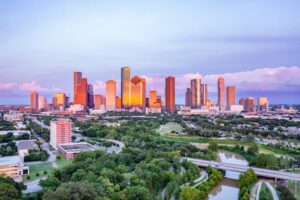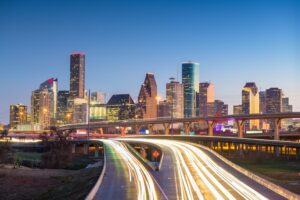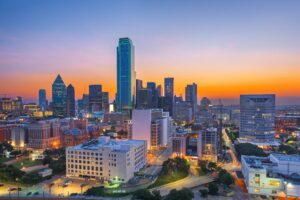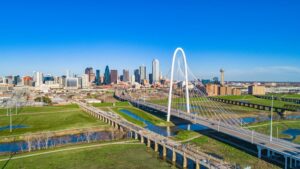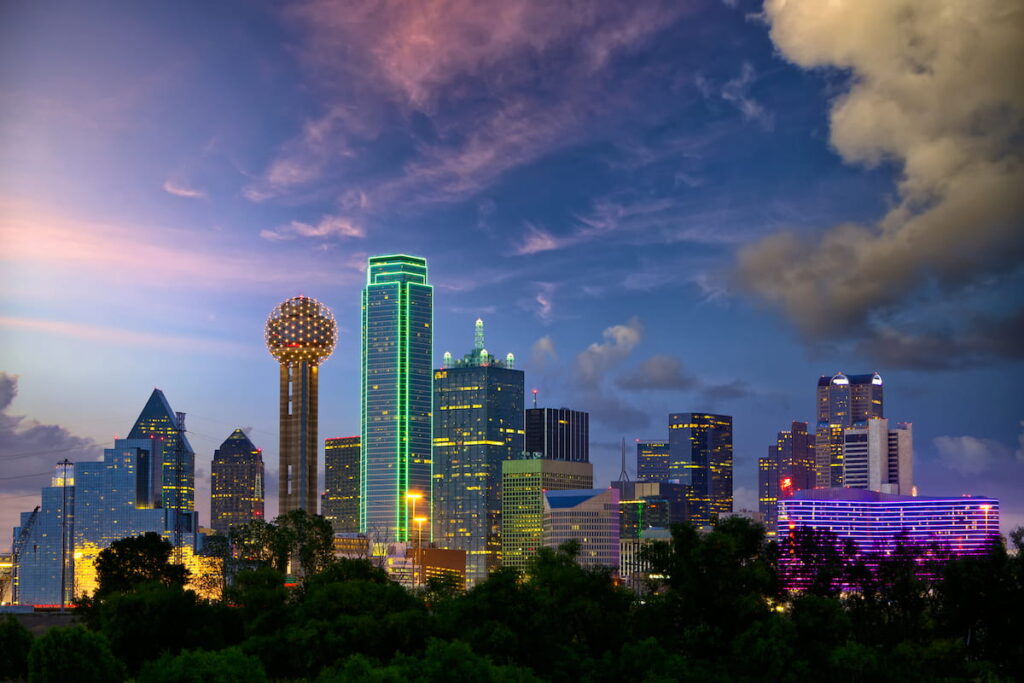
A long time saying claims “everything is bigger in Texas,” from the state’s wide, open spaces and blue skies to its iconic cowboy hats and boots. But does that lighthearted motto also apply to how much it costs to live in Texas? For anyone considering a move to the Lone Star State, the cost of living is usually one of the top priorities on their mind. If you’re thinking about relocating to a popular locale like this fast-growing city, information on the cost of living in Dallas, TX is very useful to have on hand – and an essential component of any well-planned move.
In Dallas, you can find a fabulous balance of big-city living and small-town charm, with plenty of Southern-style hospitality, top-rated restaurants and shopping, and great opportunities. When you discover everything this Texas city has to offer, it’s no wonder that it’s become one of the most desirable places to live in the region.
This guide provides a detailed breakdown of how much it costs to live in Dallas, including the average costs for housing, food, utilities, and other necessities. With this handy resource, you can decide if living in Dallas is right for you – and then, you can start searching for the perfect home.
What is the average cost of living in Dallas, TX?
In Dallas, the average cost of living calculations shows that it’s about 7% higher than the national average. However, Dallas is actually remarkably affordable compared to the average cost of living in other major cities, such as Los Angeles, Chicago, or Boston.
One of the most significant benefits of moving to Dallas is the flexibility to choose from a wide variety of neighborhoods, with options that range from ultra-affordable to high-end. Depending on your priorities, budget, and ideal lifestyle, you can easily find a community that checks all the right boxes.
Calculating the average cost of living in Dallas means taking a closer look at basic expenses, including:
- Housing
- Food
- Utilities
- Transportation
- Healthcare
- Goods and services
- Taxes
These numbers help you figure out what to expect and how to budget for a move to Dallas.
Housing costs in Dallas
The best way to describe the Dallas housing market is “red-hot,” with high demand driving intense competition. Texas was the state that welcomed the second-highest number of inbound moves in the U.S., which has helped housing costs steadily increase.
In 2021, median home prices increased by 13.55%, surpassing the $400,000 mark, and people searching online for “Dallas homes for sale” has never been higher (Google Trends). What does this mean for prospective new Dallas residents? For many, it might be far more accessible – and more financially sound – to consider looking at homes for rent in Dallas rather than trying to purchase something.
Overall, the cost of housing in Dallas is about 15.9% above the national average. Since it’s such a large and diverse city, you’ll find that the selection of properties is surprisingly diverse.
If you’re on the hunt for the most affordable neighborhoods in Dallas, check out Highland Hills or Southeast Dallas. The average rent for a one-bedroom apartment hovers around $800 to $1,000. Or, if the housing price isn’t an issue, you can look to some of Dallas’s luxury communities, including the Main Street District, East Dallas, and Knox/Henderson. Rent prices for a one-bedroom unit in these areas are around $2,000 to $2,500.
Food costs in Dallas
Dallas is a foodie’s paradise, but that doesn’t mean you’ll have to spend big just to enjoy the delicious options. In Dallas, average food costs are right in line with the national average. Balancing restaurant dining with home-cooked meals for most people makes for an easily-managed food budget.
When you’re grocery shopping in Dallas, the food prices of basic staples won’t leave you pinching pennies:
- A half-gallon of milk: $1.97
- A dozen eggs: $1.15
- A pound of ground beef: $4.42
You can also shop at Dallas farmers’ markets, gourmet or specialty stores, or big-box retailers for all your essentials.
Of course, you won’t want to miss out on the first-class dining scene in Dallas – and luckily, you can find top-rated options to fit any budget. Grab a Taco Tuesday dinner from a local food truck for under $5, or head to a downtown steakhouse for a special meal ($20 and up a plate). Living in Dallas means you’ll always be just minutes away from virtually every type of restaurant you can imagine.
Utility costs in Dallas
Like any city, Dallas utility costs primarily rely on your usage. However, compared to national averages, the prices tend to be slightly higher – about 8% higher, to be exact.
In general, the cost of utilities in Dallas is usually the expense that surprises newcomers the most. Water bills are usually around $100 or less, and the average monthly energy bill comes in close to $200. These two expenses are higher than they would be in some other major cities, mainly because of the hot, dry climate of the region.
For your phone bill, plan to set aside about $185; for internet, you’re looking at a $45 monthly average.
Transportation costs in Dallas
Before you get discouraged by your future Dallas utility bills, here’s some exciting news: transportation in and around the city is very reasonably priced, which can help offset some of your higher expenses. The average cost of transportation in Dallas is nearly 7% lower than the national figures and cheaper than what you’ll pay in other large Texas cities such as Austin and Houston.
Dallas residents can take their pick from many modes of transportation, including driving, walking, ride-sharing, or public transit. The DART (Dallas Area Rapid Transit) makes public transit a breeze, with a daily pass costing less than a gourmet latte ($6) and a monthly pass available for less than $100 (a savings of nearly 50%). Depending on what part of Dallas you live in, it can also be a very walkable city – look for homes near the city center if you’re hoping to explore the area on foot!
Or, if you prefer to drive, you can get a Toll Tag ($40) to save big on toll roads. Gas prices in Texas are usually lower than the national average, and Dallas gas prices are sometimes even more affordable than what you’ll find in other cities across the state.
Healthcare costs in Dallas
Calculating the average cost of healthcare in Dallas (or any city) can be challenging because each person has such individualized needs and preferences. But whether you require advanced medical care or only the basics of care, you’ll be happy to know that Dallas is well-known for its outstanding healthcare facilities, providers, and hospitals.
Dallas healthcare costs tend to be about 13% higher than the national average, though many would argue that the high quality of care makes the expense more than worth it. A well-check at the doctor averages about $120, a typical dentist bill is about $134, and a trip to the optometrist will run you $98.
Goods and services costs in Dallas
Once you estimate your budget for the basic bills, you can plan for the cost of consumer goods and services. This category covers anything not “consumable,” encompassing essential expenses such as pet care, fitness, landscaping, home repairs, and personal care.
For example, bringing your furry family member to the vet will cost you about $64 in Dallas. You can treat yourself to an appointment at the salon for $45, take a yoga class for $20, or see the latest Hollywood blockbuster for around $11 per movie ticket.
Taxes in Dallas
Here’s a major perk of moving to Dallas: there’s no state or local personal income tax in the state. No state income taxes means that you’ll pay the standard federal taxes, but you won’t have to worry about Texas state taxes for Social Security benefits, pensions, or any retirement income.
Dallas’s sales tax is 8.25%, 6.25% being Texas state tax, and the remainder includes all city and county taxes. But, if you have a big purchase in mind, you can wait for the three tax-free weekends in Texas. All state and local sales taxes are waived for certain items during these special periods, helping you to save big with a bit of planning.
Dallas property taxes are somewhat high. However, if you’re opting for one of the many great Dallas rental homes, you won’t have to worry about that.
How much do you need to earn in Dallas?
No matter where you live, most financial experts say that 30% of your annual income should be spent on housing. Monthly rents for a one-bedroom apartment in Dallas average around $1,390, totaling $16,680 per year. At a minimum, you’ll ideally earn at least $55,600 per year.
You can use an online cost of living calculator for a more in-depth assessment of income vs. expenses in Dallas if you’d like.
Here’s some more excellent news: the rate of job growth in Dallas is predicted to exceed the national average over the next decade. So, if you’re debating making a move, your job opportunities will be plentiful. The median household income in Dallas is about $72,265 per year, which is higher than both the median Texas household income and the U.S. median household income by several thousand dollars.
Ready to find your next home in Dallas, TX?
Dallas is a vibrant, exciting city and a wonderful place for young professionals, families, and even retirees to call home. And with its outstanding growth potential, Dallas has a very bright future.
Explore some of the top rental home communities in Texas and around the Dallas Fort-Worth area to discover the dream lifestyle that awaits you in a built-to-rent home by Wan Bridge. Contact us today if you’d like to learn more about what makes our Dallas rental houses unique or get more details about a specific build to rent community, contact us today!
Related Resources
- 7 Best Suburbs of Dallas, TX
- Moving to Dallas: Everything You Need To Know
- Average Rent in Dallas & Rent Prices by Neighborhood
- Dallas vs Houston Living: Which Is Better To Live In?
- Moving to Texas: Everything You Need To Know
Image Source: dibrova / Getty Images

